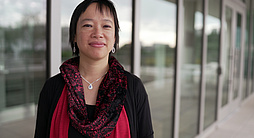Suvrit Sra
Alexander von Humboldt Professorship for Artificial Intelligence 2022 Suvrit Sra When mathematics meets AI, and optimisation, machine learning: mathematician Suvrit Sra’s fundamental works on methods
Last change:

Alexander von Humboldt Professorship for Artificial Intelligence 2022 Suvrit Sra When mathematics meets AI, and optimisation, machine learning: mathematician Suvrit Sra’s fundamental works on methods
Last change:
Alexander von Humboldt Professorship for Artificial Intelligence 2022 Stefanie Jegelka The fundamental research conducted by computer scientist Stefanie Jegelka has led to a better understanding and o
Last change:
Alexander von Humboldt Professorship for Artificial Intelligence 2022 Angela Yu At the Centre for Cognitive Science at TU Darmstadt, the adaptive and intelligent behaviour of humans and machines is a
Last change:
Alexander von Humboldt Professorship for Artificial Intelligence 2022 Vincent C. Müller Both as one of the pioneers of the young discipline of the philosophy and ethics of artificial intelligence and
Last change:
Alexander von Humboldt Professorship for Artificial Intelligence 2022 Holger Hoos No machine learning, no modern artificial intelligence (AI). But there are only a few people in the world who have the
Last change:
Alexander von Humboldt Professorship for Artificial Intelligence 2022 Sayan Mukherjee The mathematician, statistician and computer scientist Sayan Mukherjee has produced crucial work in the still youn
Last change:
Alexander von Humboldt Professorship for Artificial Intelligence 2022 Radu Timofte Whether in smartphones, traffic detectors or medical images – in many aspects of our everyday lives, we take high-qua
Last change:
Alexander von Humboldt Professorship for Artificial Intelligence 2022 Yaochu Jin Yaochu Jin is one of the leading pioneers of swarm robotics. In this special sub-area, he conflates his outstanding exp
Last change:
Alexander von Humboldt Professorship for Artificial Intelligence 2020 Daniel Rückert As the head of a new Institute for Artificial Intelligence in Healthcare and Medicine, Daniel Rückert is scheduled
Last change:







